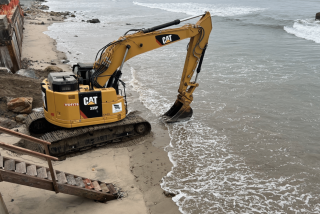San Diego Vows to Fight Panel’s Sewage Decision
SAN DIEGO — City officials Tuesday vowed to fight a state Coastal Commission action that they said could force the city to spend billions of dollars to needlessly upgrade its sewage treatment plant.
Meeting in Santa Barbara, the commission on Monday voted 6 to 1 to deny San Diego’s request to endorse the city’s bid for an extension of a waiver from the federal Clean Water Act.
The waiver allows the city to avoid an expensive upgrade of its Point Loma sewage treatment plant.
Upgrading would reduce the amount of sewage that flows into the ocean without receiving secondary treatment, which causes a more thorough breakdown of solid waste.
San Diego officials say that right now, the Point Loma plant and two smaller plants effectively treat about 83% of the city’s solid waste. They argue that secondary treatment would only lead to a 5% additional reduction.
“We would be wasting billions of taxpayers’ dollars if we upgraded a sewage facility that does not need upgrading,” said Mayor Dick Murphy.
Murphy and other officials cited the views of scientists from the Scripps Institution of Oceanography in La Jolla who contend that outflow from the Point Loma plant is not harming fish and other aquatic life.
“By ignoring the scientific community, the Coastal Commission chose dirty politics over clean water,” said San Diego Councilman Byron Wear.
The commission’s unexpected action could foreshadow a similar ruling for Orange County when its expected bid for a waiver renewal comes before the commission, possibly early next year. Orange County environmentalists immediately hailed the vote.
“The Coastal Commission is the latest nail in the coffin of the [Orange County] waiver,” said environmental activist Jan Vandersloot. “The momentum is moving forward for getting rid of the waiver and going for more thorough treatment of waste water.”
Although the waivers are issued by the U.S. Environmental Protection Agency and the state’s regional water boards, the Coastal Commission must determine whether a waiver is consistent with the California Coastal Act.
Of the nation’s 16,000 public sewer agencies, 36 have waivers that allow them to dump sewage that does not receive secondary treatment. The Orange County Sanitation District is the largest and San Diego is the second-largest.
Murphy said San Diego officials are considering three responses: an appeal to the federal government to overrule the Coastal Commission, an effort to negotiate a compromise with the commission or a lawsuit.
“Litigation is the last resort,” Murphy said. He noted that when the issue went to court in the 1990s, a federal judge agreed that the city was not violating the Clean Water Act and deserved a waiver.
Following the lead of the EPA, the staff of the Coastal Commission had endorsed the city’s bid for a renewal of its waiver. Staff members “pretty much defer to what the EPA does and we rely on that a lot, but we are not the policymakers,” said commission Executive Director Peter Douglas.
Commission Chairwoman Sara Wan, an environmental activist from Malibu, said she is dubious about assertions that waste from Point Loma is not harmful.
“If we’ve learned anything over the years--particularly in Orange County--it’s that this is a very complex situation,” Wan said. “The commission feels we need more information. Do we know there’s a problem? No, we don’t. But we also don’t know there isn’t a problem.”
Even in rejecting the city’s bid, the commission dangled the possibility that it would change its mind if the city would increase monitoring off the coast for possible harmful impacts and expand the use of reclaimed water. The commission also wants the city to do more to reduce the amount of solids being discharged by a waste pipe that stretches 4.5 miles out to sea from the Point Loma plant.
Murphy and other city officials said the plant discharges less than 11,000 metric tons per year, which is below the 15,000 tons permitted under a 1995 waiver. But Wan said the has not declined since 1995.
She said the spirit of the Clean Water Act requires cities with waivers to continually attempt to reduce emissions. Meeting the commission’s three criteria would be far cheaper than the billions of dollars mentioned by Murphy, Wan said. “What we want is very doable,” she said.
Commissioner Shirley Dettloff, a member of the Huntington Beach City Council, said she is worried about the ramifications of continuing with waivers in the 21st century. “The time has come for districts that have waivers to look at the overall goal of the state,” she said. “We’ve tried to strengthen our water quality standards throughout the state.”
Huntington Beach is one of six cities and water districts to formally oppose the renewal of the Orange County Sanitation District’s waiver.
More to Read
Sign up for Essential California
The most important California stories and recommendations in your inbox every morning.
You may occasionally receive promotional content from the Los Angeles Times.











